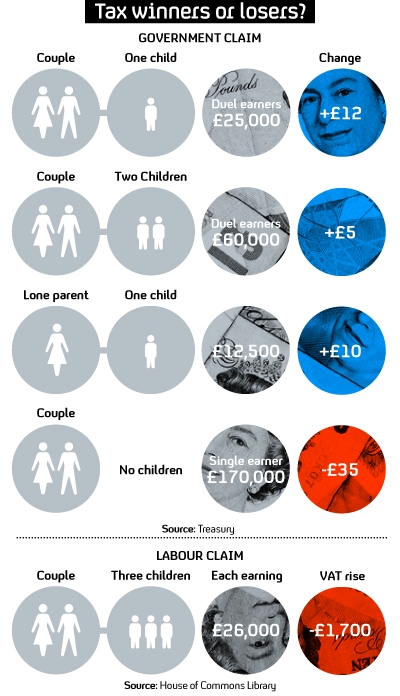‘Worse-off Wednesday’: tax changes come into force
The start of the new tax year has been dubbed “worse-off Wednesday”. One tax expert tells Channel 4 News many families will be worse-off in 2011 but not because of these changes.

Despite today being dubbed “Worse-off Wednesday” many people will pay less tax because of the changes.
How you are affected depends on how much you earn and the benefits you receive.
Labour has dubbed today “Black Wednesday” but the Government rejects claims that families face a financial squeeze, insisting the overwhelming majority of households will be better off.
The Treasury released figures which, it said, showed that the bottom 80 per cent of households in terms of income would, on average, gain from the changes which come into effect.
The tax changes
Changes to tax thresholds have come into force affecting tens of thousands of employees.
The personal allowance has risen by £1000. This means people can now earn £7,475 without paying any tax.
The Institute for Fiscal Studies (IFS) estimates half a million people will stop paying tax as a result of the increased personal allowance.
But at the other end of the scale more people will become high rate tax payers because the basic limit has fallen from £37,400 to £35,001.
The IFS says that 750,000 extra people will now start paying 40 per cent income tax
National Insurance contributions will increase by 1 per cent but there will be a rise in the number of low earners exempt from paying.
If you look overall, we probably are going to be worse-off but not as a result of today’s tax changes. Mike Warburton, tax expert
Linking increases in some benefits to the Consumer Prices Index (CPI) rather than the Retail Prices Index (RPI) will mean payments will rise by less compared to previous years.
Mike Warburton, who is head of tax at Grant Thornton, told Channel 4 News the political argument surrounding the changes was “confusing” as people don’t know who to believe.
“In a way both sides are right. The Government is right to say that four out of five people on lower incomes will benefit by the increase in personal allowance.
“But if you take Labour’s point of view people are facing higher VAT, increased petrol prices and inflation when their wages are staying pretty static.
“If you look overall, we probably are going to be worse off but not as a result of today’s tax changes.”
Winners and losers
The financial education charity Credit Action has previously calculated that households were set to lose an average of £200 a year.
But while the Treasury acknowledged that the average impact across the population was a “marginal loss”, it said the figures were “heavily skewed” by the losses at the top of the income range.
Labour meanwhile issued their own figures which, they said, showed that today’s changes when combined with January’s VAT rise, could leave some families more than £1,700 a year worse off.
Shadow chancellor Ed Balls said that what he called “Black Wednesday” would hit women with children hardest of all.
Today will be a Black Wednesday for millions of families across Britain. Ed Balls
According to the Treasury figures, a dual-earner couple with one child and a combined income of £25,000 will be £12 a week better off, a dual-earner couple with two children on £60,000 will gain £5 a week, and a lone parent with one child on £12,500 will gain £10 a week.
In contrast, a single-earner couple with no children on £170,000 will lose out to the tune of £35 a week.
However Labour published figures compiled by the independent House of Commons Library which, it said, showed that a couple with three children, with each parent earning £26,000, would lose over £1,700 a year if the VAT rise is also taken into account.
Read more: Spending cuts check - special report
Mr Balls pointed in particular to the cut in childcare costs paid through the working tax credit which could cost some families with two or more children up to £1,560.
“Today will be a Black Wednesday for millions of families across Britain. David Cameron promised to lead the most family-friendly government ever and George Osborne said we’re all in this together,” he said.
However Treasury Minister Justine Greening said that the Government had taken action to ensure that the burden of tackling the deficit would be borne by those best able to shoulder it.
“Labour left behind a complete mess with no plan to deal with it apart from run up more debts for the next generation to pay off. They want to hand over their financial mess to our children, when instead what we need to do is start sorting out the problem now,” she said.
Mike Warburton is head of tax at Grant Thornton: he answers your questions via Facebook & Twitter:
Anita Edmunds (via Facebook): My partner is on £13,000. With NI up but the personal tax allowance lifted will his take home pay be more or less?
Mike's verdict: "Anita's partner will save £200 tax because of the £1,000 personal allowance increase, and save £108 National Insurance. Don't spend it all at once!"
Catherine Bruce (via Twitter): I work 20 hrs per week paid then do voluntary work for 20 hours. Am I entitled to any benefits? I have never claimed before. I earn £170/week and live with my parents. I have no children. Will I be better off after today?
Mike's verdict: "Well done. I think the PM wants more of us to follow your example and take on voluntary work. You will save income tax of £200 and £150 in National Insurance after today. It may be that you should already qualify for some of the basic element after abatement, possibly about £900pa."
More advice: Tax changes - how will 'worse-off Wednesday' affect you?